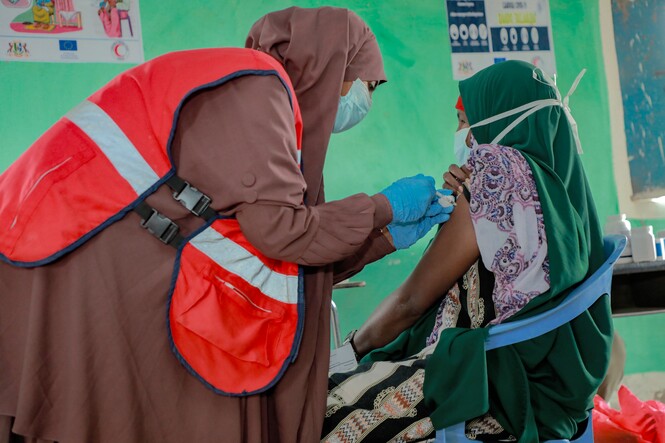
There are many components of public health emergency response. There are the most obvious – provision of medical and healthcare services, health information, community engagement and operational research.
In Africa we are very familiar with this type of work – as I write, Red Cross and Red Crescent teams across the continent are responding to COVID-19, Ebola, yellow fever, cholera, monkeypox and many other public health emergencies.
Our teams provide health education, social mobilization during mass vaccination campaigns, safe and dignified burials during viral haemorrhagic fever outbreaks (such as ebola outbreaks), set-up and running of oral rehydration points during cholera epidemics and psychological first aid.
This community-level response to public health emergencies is critically important – we know it helps keep people safe and save lives, but just as important, although rarely seen, is the work we do behind the scenes – strengthening and developing law and policy for public health emergencies.
I’m a doctor, not a lawmaker, but I know the critical role of law – the impacts and influences it has is far wider than parliamentary chambers it ripples down to what we do on the ground, in hospitals, community health centres and people’s homes.
Law and policy determine how we respond to public health emergencies – regulating who does what and when. Laws enable states of emergency to be declared for health crises, lockdowns and curfews, they can expedite vaccine approvals and provide emergency financial help for people affected by the pandemic.
During the COVID-19 pandemic, my IFRC Disaster Law colleagues examined the role of law and policy in public health emergencies. Their research found that, in many cases, laws and policies for public health emergencies are outdated or inadequate. Their research also found that these laws and policies had gaps, weaknesses and unintended consequences.
In Africa, we saw how laws that closed borders and restricted travel also limited the movement of refugees and asylum seekers seeking safety, laws that restricted freedom of movement, also restricted humanitarian and health responders contributing to the COVID-19 response, and laws that could have required governments to issue early warnings of the COVID-19 outbreak to the public, were missing.
The research is clear – we urgently need to develop and strengthen public health emergency law and policy. Little is known about the work of IFRC and Red Cross and Red Crescent Societies have supporting governments to develop and implement laws and policies for disasters and emergencies – something done tirelessly for two decades. The current pandemic has brought to the fore the need to ensure that this work extends to public health emergencies – which are indeed an emergency. As a result, my colleagues developed the Guidance on Law and Public Health Emergency Preparedness and Response.
In October 2021, together with the Africa Centre for Disease Control and Prevention, we brought together humanitarian, public health and legal experts from across Africa to gather feedback on the Guidance and to ensure it is fit for its purpose in Africa.
The Guidance is an assessment tool to support the reviewing and updating of laws, policies and plans for public health emergencies. It’s practical, with clear recommendations that will help health professionals like me, better deliver health responses – ultimately and importantly better helping people who need it most.
Key recommendations from the Guidance include:
-
requiring governments to provide early warning of health hazards to the general population
-
enabling the participation of all stakeholders as part of a One Health, all-of-society and all-of-state approach;
-
establishing measures to ensure the protection of vulnerable groups during public health emergencies;
-
providing legal rights and exemptions for humanitarian actors responding to public health emergencies, including tax exemptions and expedited customs clearance for relief goods and equipment; and
-
requiring laws, policies and plans relating to public health emergencies to be reviewed, both periodically and after the occurrence of a public health emergency.
Urgent action must be taken to strengthen law and policy for public health emergencies. With African National Red Cross and Red Crescent Societies, we are here to help respond to public health emergencies - from supporting local vaccination drives to developing laws.
We must act now. Public health emergencies are not new - from the plague to influenza, Ebola to COVID-19, they will continue to occur and impact us all. To truly save lives and keep people safe, we need to ensure we have more than medicine - law and policy must be part of the solution too.